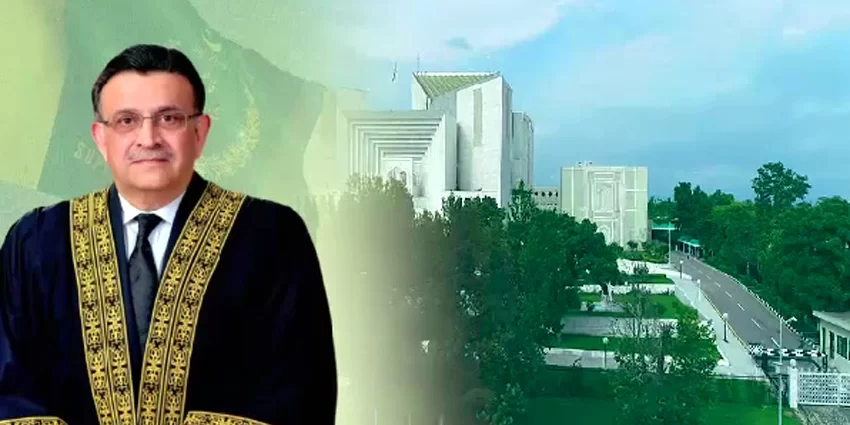CJP Umar Ata Bandial has listed two crucial cases for hearing in coming week.
On July 18 take up the petitions challenging trial of May 9 rioters in military courts.
CJP—will resume hearing on the petitions filed against the Supreme Court (Practice and Procedure) Act, 2023.
ISLAMABAD ( Web News )
Chief Justice of Pakistan (CJP) Umar Ata Bandial has listed two crucial cases for hearing in coming week. Some experts believe that outcomes of the cases will determine CJP Bandial’s legacy, who is going to hang up his spurs on September 16.
A six-members larger bench, led by CJP Bandial himself, will on July 18 take up the petitions challenging trial of May 9 rioters in military courts.
On July 21, an eight-member larger bench—also led by the CJP—will resume hearing on the petitions filed against the Supreme Court (Practice and Procedure) Act, 2023.
The law regulates the discretionary powers of the CJP by forming a committee of three senior SC judges to decide about composition of benches and listing of cases.
The apex court judges are divided on the manner in which matter is adjudicated as the eight-member larger bench suspended the effects of the law on April 13 at the first hearing of the case even before its enactment and even without hearing the Attorney General for Pakistan (AGP).
It is alleged that CJP Bandial included his “like-minded judges” in the larger bench hearing the case.
Following suspension of the law, SC senior puisne judge Qazi Faez Isa decided not to sit on any bench until the court issued its final decision on the piece of legislation.
Justice Sardar Tariq Masood, the third senior most apex court judge, also endorsed Justice Isa’s view as he also decided not to hear matters of public interest until the fate of the law was decided.
Another SC judge, Syed Mansoor Ali Shah, believes that all public interest cases should be heard by a full court until the court decides on the Supreme Court (Practice and Procedure) Act, 2023.
The federal government also wants formation of the full court to hear petitions challenging the law. The eight-member larger bench is also hearing the government’s plea about the constitution of a full court.
Last time, on June 8, AGP Mansoor Awan appeared before the bench in the chamber.
The bench had asked the AGP about the progress made on rationalizing the provisions of the Supreme Court (Practice and Procedure) Act, 2023 which overlap with another newly introduced piece of legislation, the Supreme Court (Review of Judgments and Orders) Act, 2023.
The AGP had told the bench that the preparatory and drafting work had begun but legislative work could not be undertaken on account of the budget session of parliament that was to commence on June 9.
He had told the bench that later parliament would take a short recess for Eid-ul-Azha and shall have time to start work on the Supreme Court (Practice and Procedure) Act, 2023 and the Supreme Court (Review of Judgments and Orders) Act, 2023 in the month of July.
The AGP had sought more time for the requisite legislative work. The bench had accepted his request. However, parliament has so far not started drafting the legislation.
Before this hearing, a six-members larger bench of the apex court on July 18 will take up petitions against the trial of civilians in military courts.
The government has engaged some private lawyers in this case. Shah Khawar is appearing on behalf of Interior Minister Rana Sanaullah.
It is learnt that the government was reviewing its decision to engage Dr Farogh Naseem as counsel for Prime Minister Shehbaz Sharif. The petitioners have almost completed their arguments. Now the government counsels will present their arguments.
Meanwhile, a debate continues as to whether the matter will be referred to a full court after Justice Yahya Afridi’s note in which he urged the CJP to form a full court. However, a full court cannot be formed until the SC vacates its stay on the Supreme Court (Practice and Procedure) Act, 2023.

